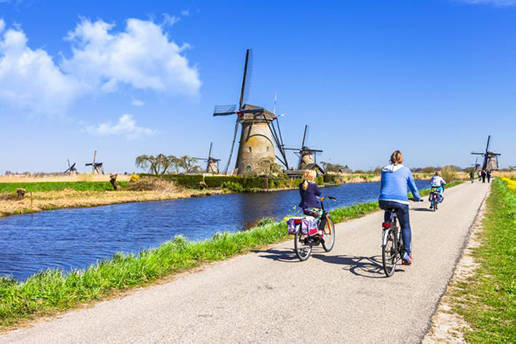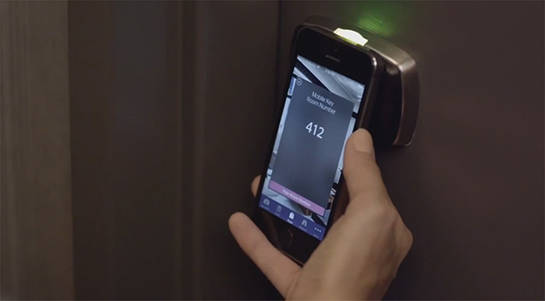- # 1 - Staycations
- #2 – Unique and local experiences
- #3 – Safety and hygiene
- #4 - Mobile check-ins
- #5 – Sustainability
- #6 – Personalization
- #7 – Chatbots
- #8 – Digital room key for quick room access
# 1 - Staycations
Last summer, countries cautiously reopened after several months of lockdown. People looked for ways to return to a semblance of normal life. The idea of a staycation is to stay in a house away from home for an extended period of time in your own country. Comfortable and safe without worrying about their health.
The number of Dutch people who went on holiday in their own country in the summer months increased by 26% in 2020 compared to the summer of 2019. That is precisely why hotels and resorts all over the world promote staycations. On top of that, they focus on the extensive steps they take to minimize the chance of infection.

Source: www.novasol.nl
#2 – Unique and local experiences
Today's tourists are looking for new experiences and specifically local experiences. Due to the limited possibilities during the pandemic, people now want to make the most of every minute. They want to know what activities they can do in the area. Think of fun outdoor activities, like bicycle tours or walking routes. Or maybe there are unique restaurants where you can draw their attention too, so they can book in time.
Most accommodations have a printed information folder, ranging from chic paper in a leather folder to a few laminated sheets. Both have a limited shelf life, which is why most tourists now rely on online information from Tripadvisor or Google Maps.
Yet, as a company, you can still distinguish yourself with offering unique and local experience to your guests. Help your guests by digitally sharing the different options prior to their stay via either:
- your website,
- an e-mail,
- or messaging channels.
With this, you can enthuse them for their stay. So recommend the local entrepreneur and ensure your guests a full experience!
#3 – Safety and hygiene
There are a number of hospitality trends that are broadly related to safety and hygiene. These have become especially important with the spread of COVID-19. The world has adapted to the virus to limit its spread as much as possible. It is essential that these points are a priority for hotels, holiday parks, restaurants, bars, and cafés.
In addition, visitors have become more aware of what they see as clean, or what they assume to be dirty. A shopping cart is dirty because someone else has touched it. But what about the remote control or a leaflet to promote local activities?
It will take some time before we feel comfortable again in a busy line or full elevator. Be aware of what measures you have already taken to prevent this.
#4 - Mobile check-ins
In the age of mobile technology, hospitality companies can improve both their operations and their guest experience by implementing a few simple things in their properties. A survey conducted by Oracle shows that 90 percent of hotel managers believe the guest experience can be improved by allowing guests to use mobile devices to manage the check-in and check-out process.
Travelers today depend on their mobile devices to check-in for a flight, order a taxi and make reservations at their favorite restaurants. They also want this convenience when checking in at their hotel. Instead of queuing at the front desk, today's guests want a simple process that allows them to go straight to their room.

Source: www.extremetech.com
#5 – Sustainability
Visitors are increasingly concerned about environmental issues and want to know that the companies they deal with are acting ethically. However, people have always had the urge to hunt, experience, and discover. That is why people will continue to travel, but they will look for opportunities to do this as sustainably as possible.
For these reasons, sustainability is one of the most striking trends and a must in communication with your visitors. Communicate which steps you have taken and how you want to become more sustainable together with your guests. Examples include restaurants promoting their vegetarian and vegan options, to hotels using smart light bulbs and smart heating to save energy. Within the hospitality sector, you also need to think about using more sustainable materials for things like towels and bed linen.

Source: www.bee-inc.com
#6 – Personalization
Personalization is a big trend in almost all industries, and this is no different in the hospitality sector. A survey conducted by Accenture found that 58% of consumers transfer half or more of their spending to a provider that is excellent at personalizing experiences without sacrificing reliability.
Despite digitization and limiting contact, visitors do want an increasingly personal approach. Not necessarily physically, but how we communicate with each other or how we take care of each other. Guests want to be treated as individuals, rather than just anonymous customers.
Personalization can be applied in different ways. Within hotels, for example, returning guests can automatically receive the same services as the last time they stayed, while also being personally greeted by a staff member on arrival using GPS technology and booking data. Be personal in your communication and distinguish yourself through an individual approach.

#7 – Chatbots
Chatbots are one of the most important hospitality trends associated with customer service and can be especially useful for quickly responding to questions, even when human resources are not available. In many cases, this can lead to first contact resolutions, but the chatbot can also collect information and pass it on to a human representative if necessary.
Companies in the hospitality industry must be able to answer the increased number of questions that the coronavirus raises. Chatbots can answer the most fundamental questions in this area in seconds.
Not only does this provide a good experience for guests, but chatbots also help companies save on customer service costs by speeding up response times, freeing up agents for more challenging work, and answering up to 80% of routine questions.
#8 – Digital room key for quick room access
This is a hospitality trend that you should notice. Swipe cards have been replaced by smartphones and apps to facilitate check-in and reduce key loss. Guests can now use the digital key using smartphones to speed up the check-in process and go through it efficiently. This is exactly what your guests need to get instant access to their room.
After an endless day of meetings or travel, guests rush to their hotel room to shower and sink into a freshly made hotel bed. But amid all that chaos, finding a room key is a headache. To avoid this frustration, various hotel chains are now introducing smartphone keys.
